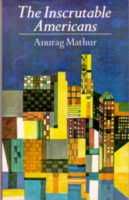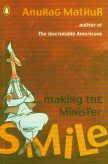

Has Indian English writing really come of age or is it just that we have moved into writing something that they can identify with? They, of course, have to identify with what goes on in the books because it is only then that the Indian writers will be recognized, greeted on the world circuit, given royalties for the never ending sales, approached by movie makers and of course, be known like never before. Perhaps, RK Narayan did not find the need to do all this as he made the readers venture into the streets of Malgudi. Perhaps Anurag Mathur did, as he greets his readers first with the neon lights of New York in "The Inscrutable Americans" and then with the starving millions of India in "Making the Minister smile".
The point is that I am not trying to say that the author is naive enough to portray the customs officials at Delhi's international airport as betel leaf chewing and spitting buffoons or to show that a student who has cleared exams like the GRE or TOEFL to gain admission to a US university is not even able to draft letters in flawless English, forget manage speaking perfectly.
The point is that he has to bring out the satire in this form to make it acceptable to the audience he intends to get his message across to. Here again, the assumption that the books are intended for the Americans or for the Indians would be rather an oversight. The section that would have enjoyed these works the most would probably be the ones in the middle, the pseudo Indians who have their own version of the great American dream and of course, the pseudo Americans who actually know the difference between Taj Mahal and Taj Mahal Hotel.
As Gopal, the protagonist of "The Inscrutable Americans" journeys across his one year stay in America, trying hard to study, avoid beef, and get laid, the readers are entertained, no doubt...but all the more so if they can identify with the characters. The book is really appreciable for those who can understand that most of the things (racial violence, sexual frustrations, loneliness) that the book shows actually happen but at the same time, there are things that have been put there just to bring out the irony, to hit them where it hurts.
In "Making the Minister smile", Chris is shown following a similar pattern, just that his domain is not academic but the thick of Delhi commerce and the intertwining politics. As the author demolishes deeply held ideas about India and Indians by exposing the truths (as he sees them, perhaps) about the fidelity of Indian women, of the lack of food to even feed the middle class, or introduces the readers to the idea of a television and radio in each of the homes in the slums, it might seem that he is trying something novel and to a majority of Americans, it might as well be novel.
However, the people who are going to read his book, as the author must have known, already know these things as facts. The only eyes that the book is going to open for them are the eyes of mirth and laughter for they are the ones who will be able to appreciate the subtlety with which Anurag Mathur has got the satire working for him...how he has touched their heart when he shows things happening that they have always been trying to convince others of.
When read as parts of a series, the two books are interesting readings in deed. Not only do they try a jab at the incomer (the Indian in the first and the American in the second), but the things that are said about the host countries' social fabric are quite intricate as well. Delhi politics, trade unionism, America's racial problems, the supposedly sex starved (or overfed??) American youth...all these things make the books a racy reading for even those who might not really understand what exactly is going on. All the same, the books might help form inaccurate opinions given the amount of popularity that they have already gained and given that all readers (attracted by the popularity) may not be able to appreciate the reasons for introducing satire and logic or their placement in the stories.
No comments:
Post a Comment